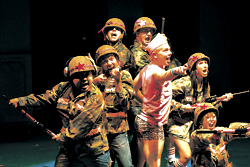We’ve just come to the end of another Gay Pride Week, which seems increasingly less like a celebration of a repressed culture and more like a run-of-the-mill drink-and-danceathon. But there are still a half-dozen theater companies featuring gay-themed shows this time of year, hoping to find a big pink cash cow. The acceptance of gays in mainstream society has progressed exponentially in the past few years, and as a side effect, gay culture has begun to lose its distinctive identity, a dilemma that affects gay theater too.
Gay artists have been at the center of theater since there’s been a stage, though in the first half of the 20th century, homosexual writers like Noël Coward, Tennessee Williams, and William Inge remained closeted or extremely discreet. When they portrayed gays on stage, it was through an odd lens of allusion and code. The results were occasionally great drama, but just as often some really weird characters and situations—think about Brick hobbling around on his crutch in Cat on a Hot Tin Roof, or Sebastian in Suddenly Last Summer, whose dalliances with young boys results in his being torn to pieces and eaten. (Eww.) By the late ’60s, the gay-rights movement included out-and-proud playwrights like Terrence McNally and Mart Crowley, whose play The Boys in the Band was the first commercially successful drama about openly gay characters—though as in earlier works, their lives were dominated by self-loathing, not self-fulfillment.
AIDS changed a lot of things in the theater, not least because of the horrible swath the disease tore across the lives of actors, directors, writers, and artists. Plays like Larry Kramer’s The Normal Heart and William M. Hoffman’s As Is sounded the alarm about the virus in the mid-’80s, when it had barely broken into public consciousness. And AIDS is the emotional centerpiece of one of the greatest plays of the past century, Angels in America. These works put homosexual characters front and center, and showed that they could be more than funny or self-loathing—they could face a deadly plague with courage, compassion, and even transcendence.
But with the retreat of the disease (though it’s still out there, folks), there’s also been a decrease in gay plays that seem particularly significant. Yes, there’s been the brilliant docu-drama work of Moisés Kaufmann and his company (The Laramie Project is their best-known work), but most recently successful works tackle relatively trivial issues like the outing of sports athletes (Take Me Out) or movie stars (The Little Dog Laughed, which opens at Intiman Aug. 15). Tony Kushner himself hasn’t been able to match his masterpiece.
Playwright Tara McMillen, whose new play The Amazing Dickie is closing July 2 at Odd Duck Studio, admits that while one of her themes remains all too relevant (gay-bashing), another issue—a teenager’s terror of revealing his sexuality to his family—has changed significantly. “Today kids have it easier than I did when I was growing up. There’s still a lot of fear and a lot of jokes about gays among teens, but if they can’t face coming out to their family or if they’re rejected, that doesn’t mean they’ll just end up out on the street any more.”
Brandon Ivie is directing Zanna, Don’t!, a sly parable about a world where almost everyone’s gay and a straight couple encounter heterophobia. [See this week’s review.] It premiered off-Broadway in 2003 and is currently having its first Northwest production by Ivie’s company, Contemporary Classics, at the Rep’s PONCHO space. He sees the musical’s focus not just on gay rights but on “the general human-rights issue of who’s to say who should love who. These are the themes that are always going to be important, regardless of where we get with acceptance of gays.”
Viktor Janusz, co-creator of the cabaret Pinkaboo! running concurrently with ACT’s production of A Marvelous Party, says his aim with the late-night entertainment was more to celebrate gay culture than decry its difficulties—though the show’s title song was inspired by his own run-in with gay-bashers in New York many years ago. In a show replete with cross-dressing, corny jokes, and guest appearances by performing powerhouses like Kevin Kent and Sarah Rudinoff, there’s not much space for profundity. But when I ask him what themes he’d like to see gay plays address, he’s got a serious answer. “I think that the last taboo is really genuine sentimentality. Can gay men be monogamous instead of running around looking for love? That’s what I’d like to see—a gay play that’s about profound love.”








